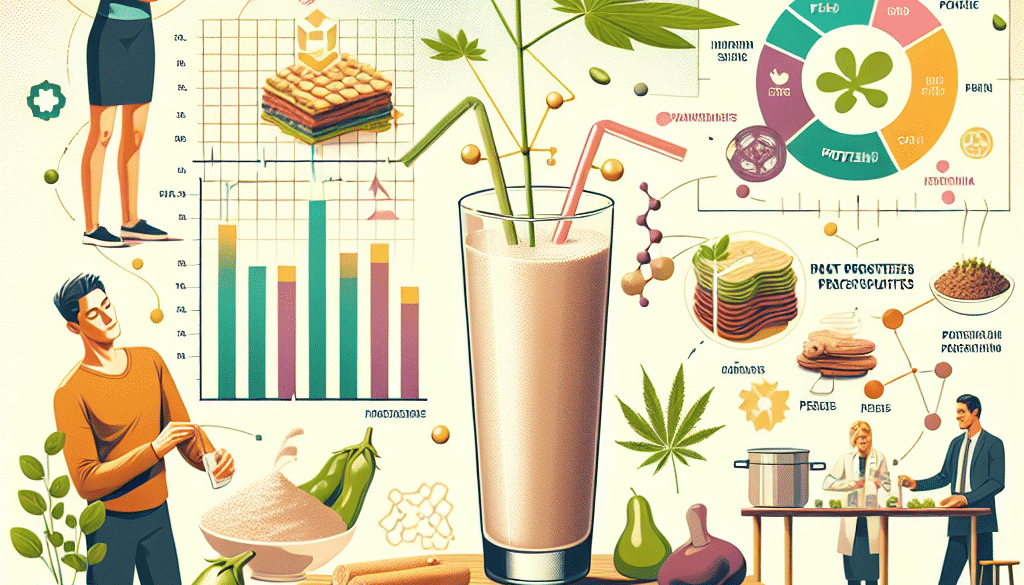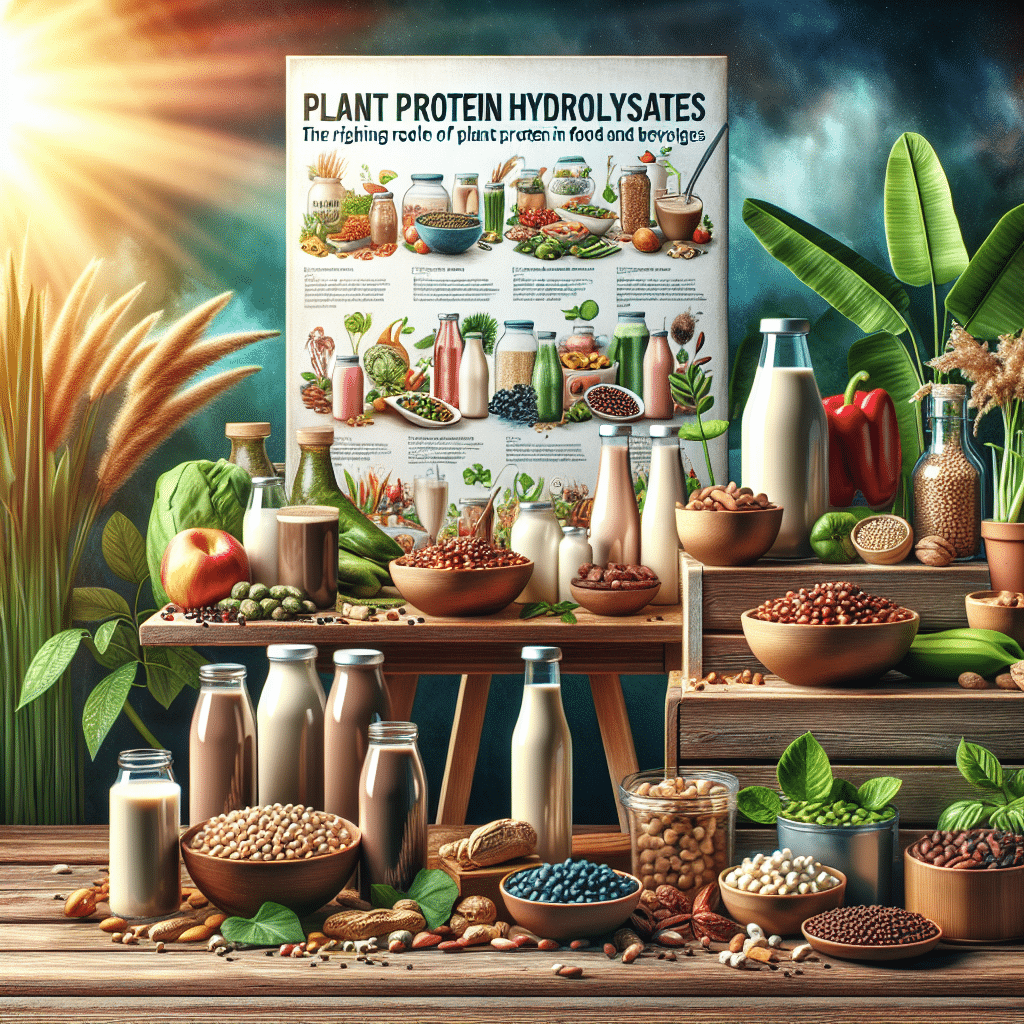Plant Protein Power: Hydrolysates’ Rising Role in Food and Beverages
-
Table of Contents
- Plant Protein Power: The Rise of Hydrolysates in Food and Beverages
- Understanding Plant Protein Hydrolysates
- Benefits of Plant Protein Hydrolysates
- Applications in Food and Beverages
- Market Trends and Consumer Demand
- Case Studies and Success Stories
- Challenges and Considerations
- Conclusion: Embracing the Power of Plant Protein Hydrolysates
- Discover ETChem’s Premium Plant Protein Products
Plant Protein Power: The Rise of Hydrolysates in Food and Beverages
The global food and beverage industry is witnessing a significant shift towards plant-based proteins, with protein hydrolysates emerging as a key player. These hydrolyzed plant proteins are gaining popularity due to their enhanced digestibility, improved functionality, and ability to cater to various dietary preferences and restrictions. This article delves into the rising role of plant protein hydrolysates in the food and beverage sector, exploring their benefits, applications, and the latest trends shaping their demand.
Understanding Plant Protein Hydrolysates
Protein hydrolysates are proteins that have been broken down into smaller peptide chains or amino acids through a process called hydrolysis. This process can involve enzymes, acids, or alkalis, and it makes the protein easier to digest and absorb. Plant protein hydrolysates are derived from various sources such as soy, rice, pea, and hemp, and they are becoming increasingly popular in various dietary supplements and food products.
Benefits of Plant Protein Hydrolysates
Plant protein hydrolysates offer a range of benefits that contribute to their growing popularity:
- Enhanced Digestibility: The hydrolysis process breaks down proteins into smaller peptides, making them easier for the body to digest and absorb.
- Hypoallergenic Properties: Hydrolysates are often less allergenic than whole proteins, making them suitable for individuals with food sensitivities.
- Improved Solubility and Stability: Hydrolyzed proteins tend to be more soluble in water and more stable in various pH conditions, which is beneficial for food and beverage formulations.
- Functional Benefits: They can improve the texture, taste, and shelf-life of products, making them a versatile ingredient in the food industry.
Applications in Food and Beverages
Plant protein hydrolysates are used in a wide range of food and beverage products:
- Sports Nutrition: They are a staple in sports drinks, protein bars, and recovery supplements due to their rapid absorption and muscle repair properties.
- Infant Formula: Hydrolysates are used in hypoallergenic infant formulas to cater to babies with milk allergies or intolerances.
- Plant-Based Alternatives: They are incorporated into plant-based meat and dairy alternatives to enhance protein content and improve texture.
- Functional Beverages: Hydrolysates are added to functional beverages for their nutritional benefits and to support overall health and wellness.
Market Trends and Consumer Demand
The demand for plant protein hydrolysates is driven by several market trends:
- Health and Wellness: Consumers are increasingly seeking out products that support their health goals, including those with added protein.
- Plant-Based Diets: The rise of veganism and vegetarianism has led to a surge in demand for plant-based protein sources.
- Clean Label Movement: There is a growing preference for products with simple, recognizable ingredients, and plant protein hydrolysates fit this bill.
- Sustainability Concerns: Plant-based proteins are often viewed as more sustainable than animal-based proteins, appealing to environmentally conscious consumers.
Case Studies and Success Stories
Several brands have successfully incorporated plant protein hydrolysates into their products:
- A leading sports nutrition company launched a new line of plant-based protein powders featuring pea protein hydrolysate, catering to athletes and fitness enthusiasts.
- An infant nutrition brand developed a hypoallergenic formula using rice protein hydrolysate, providing a safe option for infants with dairy allergies.
- A beverage company introduced a functional drink with added soy protein hydrolysate, targeting health-conscious consumers looking for a protein boost.
Challenges and Considerations
Despite the benefits, there are challenges to consider when using plant protein hydrolysates:
- Taste and Flavor: Hydrolysates can have a bitter taste, which may require flavor masking or the use of sweeteners.
- Cost: The production of hydrolysates can be more expensive than whole proteins, potentially impacting the final product price.
- Regulatory Hurdles: There may be regulatory challenges related to labeling and health claims associated with protein hydrolysates.
Conclusion: Embracing the Power of Plant Protein Hydrolysates
The rise of plant protein hydrolysates in the food and beverage industry is a testament to their versatility, nutritional benefits, and consumer appeal. As the market continues to evolve, these ingredients are poised to play an even more significant role in shaping the future of food and nutrition. By understanding the benefits, applications, and market trends, food manufacturers can leverage the power of plant protein hydrolysates to meet the growing demand for healthy, sustainable, and delicious products.
Discover ETChem’s Premium Plant Protein Products
If you’re looking to incorporate high-quality plant protein hydrolysates into your food and beverage products, ETChem offers a range of superior protein solutions. Their expertise in producing and supplying top-tier collagens and plant proteins ensures that your products will benefit from the highest quality ingredients available. With a commitment to excellence and customer satisfaction, ETChem is your go-to source for all your protein needs.
About ETChem:
ETChem, a reputable Chinese Collagen factory manufacturer and supplier, is renowned for producing, stocking, exporting, and delivering the highest quality collagens. They include marine collagen, fish collagen, bovine collagen, chicken collagen, type I collagen, type II collagen and type III collagen etc. Their offerings, characterized by a neutral taste, instant solubility attributes, cater to a diverse range of industries. They serve nutraceutical, pharmaceutical, cosmeceutical, veterinary, as well as food and beverage finished product distributors, traders, and manufacturers across Europe, USA, Canada, Australia, Thailand, Japan, Korea, Brazil, and Chile, among others.
ETChem specialization includes exporting and delivering tailor-made collagen powder and finished collagen nutritional supplements. Their extensive product range covers sectors like Food and Beverage, Sports Nutrition, Weight Management, Dietary Supplements, Health and Wellness Products, ensuring comprehensive solutions to meet all your protein needs.
As a trusted company by leading global food and beverage brands and Fortune 500 companies, ETChem reinforces China’s reputation in the global arena. For more information or to sample their products, please contact them and email karen(at)et-chem.com today.





